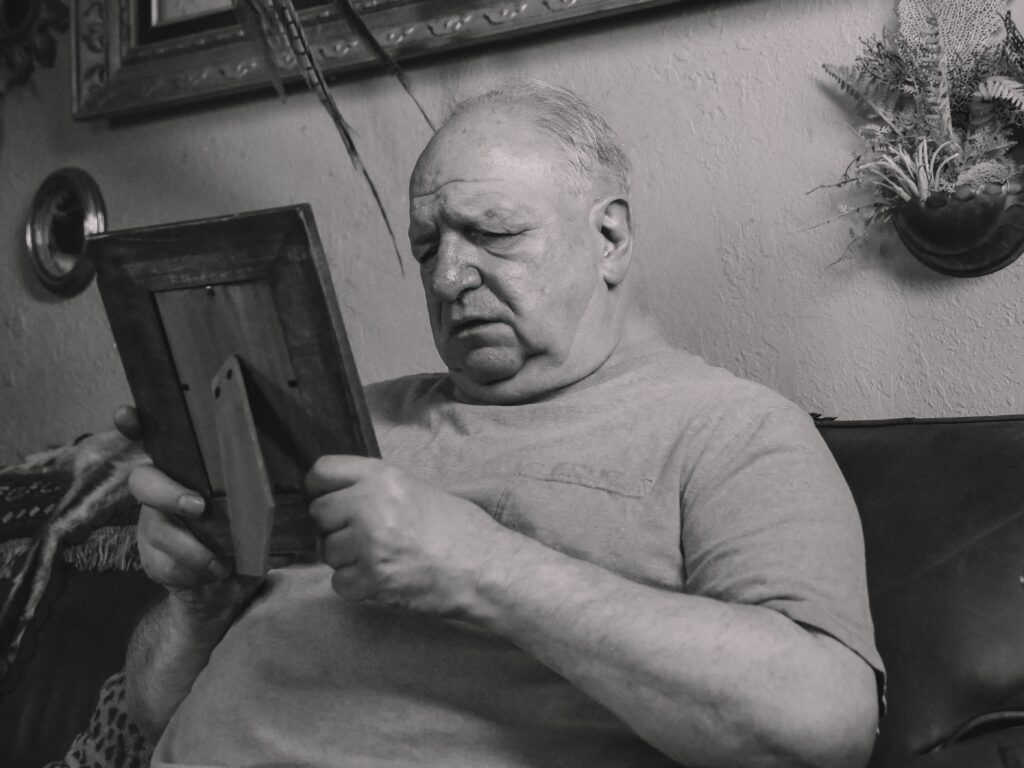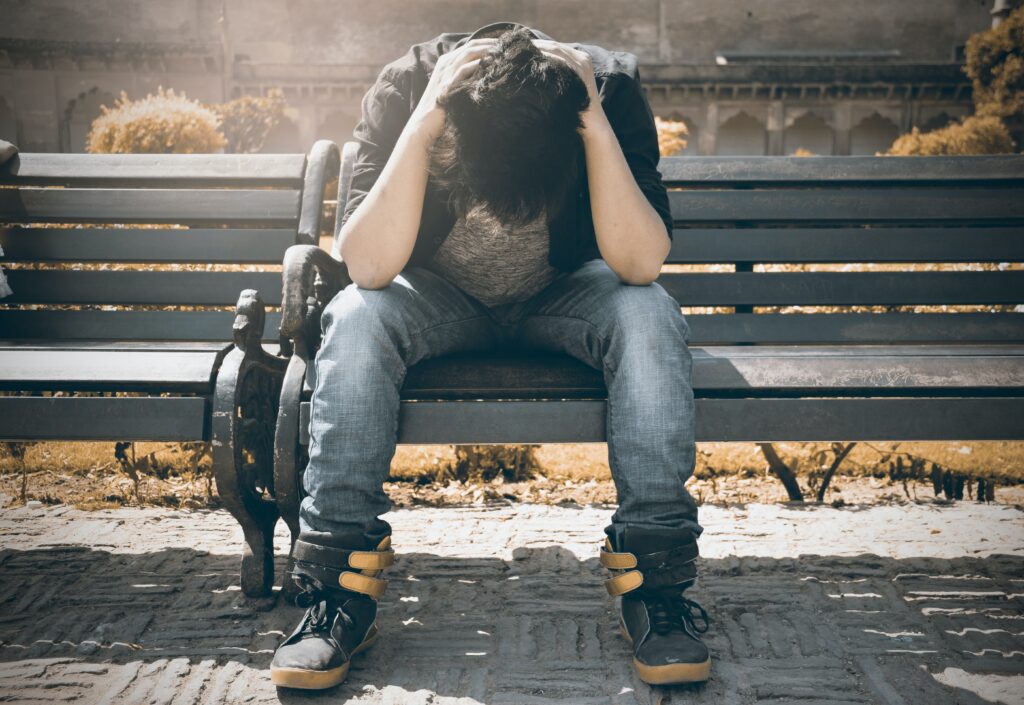
Anxiety is a common and normal emotion that everyone experiences from time to time. It can help us cope with stressful situations, such as giving a presentation, taking a test, or facing a challenge. However, when anxiety becomes excessive, persistent, or interferes with your daily life, it can be a sign of an anxiety disorder.
Anxiety disorders are among the most prevalent mental health conditions in the world. According to the World Health Organization (WHO), one in 13 people globally suffers from an anxiety disorder. In the United States, anxiety disorders affect about 40 million adults every year, or 18.1% of the population.
While anxiety disorders can affect anyone, regardless of gender, age, race, or socioeconomic status, there are some differences in how they manifest and impact men and women. In this blog post, we will explore how anxiety affects men at different ages, what are the common causes and symptoms of anxiety in men, and what are some effective ways to cope with and treat anxiety in men.
Anxiety in Men: The Facts and Figures
Anxiety disorders are often considered to be more common in women than in men. This is partly because women are more likely to seek help and report their symptoms than men, who may be reluctant to admit or acknowledge their mental health issues due to stigma, shame, or social expectations.
However, recent studies suggest that the gender gap in anxiety disorders may not be as large as previously thought. A meta-analysis of 48 epidemiological studies from 12 countries found that the lifetime prevalence of any anxiety disorder was 16.6% for women and 9.8% for men. Another meta-analysis of 199 studies from 90 countries found that the 12-month prevalence of any anxiety disorder was 7.3% for women and 4.3% for men.
These findings indicate that anxiety disorders are still more prevalent in women than in men, but not by a huge margin. Moreover, some types of anxiety disorders may be equally or even more common in men than in women. For example, social anxiety disorder (SAD), which is characterized by a fear of negative evaluation or embarrassment in social situations, affects about 7% of men and 6.8% of women in their lifetime. Obsessive-compulsive disorder (OCD), which involves recurrent and intrusive thoughts (obsessions) and repetitive behaviors (compulsions) that aim to reduce anxiety, affects about 2.3% of men and 2.2% of women in their lifetime.
Another important factor to consider is that anxiety disorders may present differently in men and women, depending on their age, culture, personality, and coping strategies. For example, men may be more likely to experience physical symptoms of anxiety, such as sweating, trembling, chest pain, or shortness of breath. Men may also be more likely to use substances such as alcohol or drugs to self-medicate their anxiety, which can lead to addiction or dependence problems. Men may also be more prone to developing anger or aggression issues as a result of their anxiety, which can affect their relationships and work performance.
Therefore, it is important to recognize that anxiety in men is a real and serious issue that deserves attention and care. In the following sections, we will discuss how anxiety affects men at different stages of their life cycle: adolescence, young adulthood, middle age, and older age.
Anxiety in Adolescent Boys

Adolescence is a period of rapid physical, emotional, social, and cognitive development that can bring many challenges and opportunities for boys. It is also a time when many mental health problems can emerge or worsen, including anxiety disorders.
According to the National Institute of Mental Health (NIMH), about 8% of adolescents aged 13-18 have an anxiety disorder. Among boys, the most common types of anxiety disorders are SAD (5.1%), generalized anxiety disorder (GAD) (2.8%), panic disorder (2%), OCD (1%), and post-traumatic stress disorder (PTSD) (0.8%).
Some of the factors that can contribute to the development or exacerbation of anxiety disorders in adolescent boys include:
- Puberty: The hormonal changes that occur during puberty can affect mood regulation and increase vulnerability to stress and anxiety. Boys may also experience anxiety about their physical appearance, sexual development, or gender identity.
- Peer pressure: Adolescence is a time when boys may feel the need to conform to social norms and expectations, such as being popular, athletic, or masculine. Boys who do not fit these stereotypes may face bullying, rejection, or isolation from their peers, which can trigger or worsen anxiety.
- Academic stress: Adolescence is also a time when boys may face increased academic demands and expectations, such as preparing for college or career choices. Boys who struggle with learning difficulties, low self-esteem, or perfectionism may experience anxiety about their academic performance or future prospects.
- Family conflict: Adolescence is often a period of conflict and tension between parents and children, as boys seek more autonomy and independence from their family. Boys who have poor communication skills, low emotional regulation, or unresolved trauma may experience anxiety as a result of family conflict or instability.
- Traumatic events: Adolescence is also a time when boys may be exposed to traumatic events, such as violence, abuse, accidents, or natural disasters. Boys who witness or experience trauma may develop PTSD, which involves re-experiencing the traumatic event, avoiding reminders of the event, negative changes in mood and cognition, and increased arousal and reactivity.
Some of the common signs and symptoms of anxiety disorders in adolescent boys include:
- Physical symptoms: These may include headaches, stomachaches, nausea, dizziness, palpitations, chest pain, shortness of breath, sweating, trembling, muscle tension, or insomnia.
- Emotional symptoms: These may include nervousness, worry, fear, panic, irritability, anger, sadness, guilt, shame, or hopelessness.
- Behavioral symptoms: These may include avoidance of anxiety-provoking situations or stimuli, such as school, social events, or public places; withdrawal from friends or family; poor concentration or memory; low academic performance or attendance; substance use or abuse; aggression or violence; self-harm or suicidal thoughts.
If you are an adolescent boy who is experiencing anxiety or any of these symptoms, you are not alone and there is help available. Here are some steps you can take to cope with and overcome your anxiety:
- Seek professional help: The first and most important step is to seek professional help from a qualified mental health provider who can diagnose your condition and offer you appropriate treatment options. Treatment for anxiety disorders may include psychotherapy (such as cognitive-behavioral therapy), medication (such as antidepressants or anti-anxiety drugs), or a combination of both. Treatment can help you learn how to manage your anxiety symptoms, identify and challenge your negative thoughts and beliefs, develop coping skills and strategies, and improve your self-esteem and confidence.
- Talk to someone you trust: Another helpful step is to talk to someone you trust about your feelings and concerns. This could be a parent, a sibling, a friend, a teacher, a counselor, or anyone else who can offer you support and understanding. Talking to someone can help you feel less alone and isolated, and can also provide you with practical advice or guidance on how to deal with your situation.
- Practice relaxation techniques: Anxiety can cause physical and mental tension that can interfere with your daily functioning and well-being. Practicing relaxation techniques can help you reduce your stress levels and calm your body and mind. Some examples of relaxation techniques include deep breathing exercises, progressive muscle relaxation, meditation, yoga, or listening to soothing music.
- Engage in physical activity: Physical activity can also help you cope with anxiety by releasing endorphins (natural chemicals that make you feel good) in your brain, improving your mood and energy levels, and distracting you from your worries. Physical activity can also improve your physical health and fitness, which can boost your self-esteem and confidence. Try to engage in at least 30 minutes of moderate physical activity every day, such as walking, jogging, cycling, swimming, or playing sports.
- Join a support group: Joining a support group can also help you cope with anxiety by connecting you with other people who share similar experiences and challenges. Support groups can provide you with a safe and supportive environment where you can express your feelings, learn from others, and receive feedback and encouragement. You can find support groups online or in your local community through various organizations or websites.
- Avoid substances: As mentioned earlier, substance use or abuse can be a common coping mechanism for some adolescent boys who suffer from anxiety. However, substances such as alcohol or drugs can worsen your anxiety symptoms in the long run by impairing your judgment, causing dependency or addiction problems, and increasing the risk of negative consequences such as legal troubles, health issues, or interpersonal conflicts. Therefore, it is advisable to avoid substances altogether or seek professional help if you have a substance use or abuse problem.
Anxiety in Young Adult Men

Young adulthood is another stage of life that can bring many changes and challenges for men. It is a time when men may face increased responsibilities and expectations, such as pursuing higher education, starting a career, forming romantic relationships, or becoming a parent. It is also a time when men may experience more stress and uncertainty, such as financial difficulties, job insecurity, relationship problems, or social isolation.
According to the NIMH, about 22.8% of adults aged 18-29 have an anxiety disorder. Among men, the most common types of anxiety disorders are SAD (9.1%), GAD (5.7%), panic disorder (3.8%), OCD (2.3%), and PTSD (3.6%).
Some of the factors that can contribute to the development or exacerbation of anxiety disorders in young adult men include:
- Career stress: Young adulthood is a time when men may face increased pressure and competition in their career choices and goals. Men who have high ambitions, low self-efficacy, or unrealistic expectations may experience anxiety about their career prospects, performance, or satisfaction. Men who face job loss, unemployment, underemployment, or discrimination may also experience anxiety about their financial security or social status.
- Relationship stress: Young adulthood is also a time when men may form or maintain romantic relationships, which can be a source of joy and fulfillment, but also of stress and anxiety. Men who have attachment issues, low self-esteem, or poor communication skills may experience anxiety about their relationship quality, stability, or compatibility. Men who face relationship conflicts, breakups, divorce, or infidelity may also experience anxiety about their emotional well-being or future prospects.
- Parenting stress: Young adulthood is also a time when some men may become fathers, which can be a rewarding and meaningful role, but also a stressful and demanding one. Men who have low parenting skills, high expectations, or limited support may experience anxiety about their parenting abilities, responsibilities, or outcomes. Men who face parenting challenges, such as child behavioral problems, health issues, or custody disputes may also experience anxiety about their child’s well-being or their own role as a father.
- Social stress: Young adulthood is also a time when men may face increased social demands and expectations, such as making new friends, maintaining old ones, or joining social groups or networks. Men who have social anxiety, low self-confidence, or poor social skills may experience anxiety about their social interactions, acceptance, or belonging. Men who face social isolation, loneliness, or rejection may also experience anxiety about their social support or connectedness.
Some of the common signs and symptoms of anxiety disorders in young adult men include:
- Physical symptoms: These may include headaches, stomachaches, nausea, dizziness, palpitations, chest pain, shortness of breath, sweating, trembling, muscle tension, or insomnia.
- Emotional symptoms: These may include nervousness, worry, fear, panic, irritability, anger, sadness, guilt, shame, or hopelessness.
- Behavioral symptoms: These may include avoidance of anxiety-provoking situations or stimuli, such as work, school, social events, or public places; withdrawal from friends or family; poor concentration or memory; low work or academic performance or attendance; substance use or abuse; aggression or violence; self-harm or suicidal thoughts.
If you are a young adult man who is experiencing anxiety or any of these symptoms, you are not alone and there is help available. Here are some steps you can take to cope with and overcome your anxiety:
- Seek professional help: The first and most important step is to seek professional help from a qualified mental health provider who can diagnose your condition and offer you appropriate treatment options. Treatment for anxiety disorders may include psychotherapy (such as cognitive-behavioral therapy), medication (such as antidepressants or anti-anxiety drugs), or a combination of both. Treatment can help you learn how to manage your anxiety symptoms, identify and challenge your negative thoughts and beliefs, develop coping skills and strategies, and improve your self-esteem and confidence.
- Talk to someone you trust: Another helpful step is to talk to someone you trust about your feelings and concerns. This could be a parent, a sibling, a friend, a partner, a coworker, a mentor, or anyone else who can offer you support and understanding. Talking to someone can help you feel less alone and isolated, and can also provide you with practical advice or guidance on how to deal with your situation.
- Practice relaxation techniques: Anxiety can cause physical and mental tension that can interfere with your daily functioning and well-being. Practicing relaxation techniques can help you reduce your stress levels and calm your body and mind. Some examples of relaxation techniques include deep breathing exercises, progressive muscle relaxation, meditation, yoga, or listening to soothing music.
- Engage in physical activity: Physical activity can also help you cope with anxiety by releasing endorphins (natural chemicals that make you feel good) in your brain, improving your mood and energy levels, and distracting you from your worries. Physical activity can also improve your physical health and fitness, which can boost your self-esteem and confidence. Try to engage in at least 30 minutes of moderate physical activity every day, such as walking, jogging, cycling, swimming, or playing sports.
- Join a support group: Joining a support group can also help you cope with anxiety by connecting you with other people who share similar experiences and challenges. Support groups can provide you with a safe and supportive environment where you can express your feelings, learn from others, and receive feedback and encouragement. You can find support groups online or in your local community through various organizations or websites.
- Avoid substances: As mentioned earlier, substance use or abuse can be a common coping mechanism for some young adult men who suffer from anxiety. However, substances such as alcohol or drugs can worsen your anxiety symptoms in the long run by impairing your judgment, causing dependency or addiction problems, and increasing the risk of negative consequences such as legal troubles, health issues, or interpersonal conflicts. Therefore, it is advisable to avoid substances altogether or seek professional help if you have a substance use or abuse problem.
Anxiety in Middle-Aged Men

Middle age is another stage of life that can bring many changes and challenges for men. It is a time when men may face increased responsibilities and expectations, such as advancing in their career, supporting their family, caring for their aging parents, or planning for their retirement. It is also a time when men may experience more stress and uncertainty, such as career stagnation, financial difficulties, health problems, marital issues, or midlife crisis.
According to the NIMH, about 14.3% of adults aged 30-44 have an anxiety disorder. Among men, the most common types of anxiety disorders are SAD (6.8%), GAD (4.1%), panic disorder (2.7%), OCD (1.6%), and PTSD (3%).
Some of the factors that can contribute to the development or exacerbation of anxiety disorders in middle-aged men include:
- Career stress: Middle age is a time when men may face increased pressure and competition in their career choices and goals. Men who have high ambitions, low self-efficacy, or unrealistic expectations may experience anxiety about their career prospects, performance, or satisfaction. Men who face job loss, unemployment, underemployment, or discrimination may also experience anxiety about their financial security or social status.
- Family stress: Middle age is also a time when men may face increased demands and expectations from their family members, such as their spouse, children, parents, or siblings. Men who have poor communication skills, low emotional regulation, or unresolved trauma may experience anxiety as a result of family conflict or instability. Men who face family challenges, such as divorce, separation, infidelity, child custody disputes, parental illness or death, or sibling rivalry may also experience anxiety about their family well-being or their own role as a husband, father, son, or brother.
- Health stress: Middle age is also a time when men may face increased risk of developing physical health problems, such as high blood pressure, high cholesterol, diabetes, heart disease, stroke, cancer, or erectile dysfunction. Men who have poor health habits, low self-care, or limited access to health care may experience anxiety about their health status or prognosis. Men who face health problems, such as chronic pain, disability, illness, injury, or surgery may also experience anxiety about their recovery or quality of life.
- Midlife crisis: Middle age is also a time when some men may experience a midlife crisis, which is a psychological phenomenon that involves questioning one’s identity, values, goals, achievements, or happiness. Men who have a midlife crisis may feel dissatisfied, restless, bored, or depressed with their current life situation, and may seek to make drastic changes, such as changing their career, lifestyle, appearance, or relationships. Men who have a midlife crisis may also experience anxiety about their aging process, mortality, or legacy.
Some of the common signs and symptoms of anxiety disorders in middle-aged men include:
- Physical symptoms: These may include headaches, stomachaches, nausea, dizziness, palpitations, chest pain, shortness of breath, sweating, trembling, muscle tension, or insomnia.
- Emotional symptoms: These may include nervousness, worry, fear, panic, irritability, anger, sadness, guilt, shame, or hopelessness.
- Behavioral symptoms: These may include avoidance of anxiety-provoking situations or stimuli, such as work, family, social events, or public places; withdrawal from friends or family; poor concentration or memory; low work or family performance or satisfaction; substance use or abuse; aggression or violence; self-harm or suicidal thoughts.
If you are a middle-aged man who is experiencing anxiety or any of these symptoms, you are not alone and there is help available. Here are some steps you can take to cope with and overcome your anxiety:
- Seek professional help: The first and most important step is to seek professional help from a qualified mental health provider who can diagnose your condition and offer you appropriate treatment options. Treatment for anxiety disorders may include psychotherapy (such as cognitive-behavioral therapy), medication (such as antidepressants or anti-anxiety drugs), or a combination of both. Treatment can help you learn how to manage your anxiety symptoms, identify and challenge your negative thoughts and beliefs, develop coping skills and strategies, and improve your self-esteem and confidence.
- Talk to someone you trust: Another helpful step is to talk to someone you trust about your feelings and concerns. This could be a spouse, a child, a friend, a coworker, a mentor, or anyone else who can offer you support and understanding. Talking to someone can help you feel less alone and isolated, and can also provide you with practical advice or guidance on how to deal with your situation.
- Practice relaxation techniques: Anxiety can cause physical and mental tension that can interfere with your daily functioning and well-being. Practicing relaxation techniques can help you reduce your stress levels and calm your body and mind. Some examples of relaxation techniques include deep breathing exercises, progressive muscle relaxation, meditation, yoga, or listening to soothing music.
- Engage in physical activity: Physical activity can also help you cope with anxiety by releasing endorphins (natural chemicals that make you feel good) in your brain, improving your mood and energy levels, and distracting you from your worries. Physical activity can also improve your physical health and fitness, which can boost your self-esteem and confidence. Try to engage in at least 30 minutes of moderate physical activity every day, such as walking, jogging, cycling, swimming, or playing sports.
- Join a support group: Joining a support group can also help you cope with anxiety by connecting you with other people who share similar experiences and challenges. Support groups can provide you with a safe and supportive environment where you can express your feelings, learn from others, and receive feedback and encouragement. You can find support groups online or in your local community through various organizations or websites.
- Avoid substances: As mentioned earlier, substance use or abuse can be a common coping mechanism for some middle-aged men who suffer from anxiety. However, substances such as alcohol or drugs can worsen your anxiety symptoms in the long run by impairing your judgment, causing dependency or addiction problems, and increasing the risk of negative consequences such as legal troubles, health issues, or interpersonal conflicts. Therefore, it is advisable to avoid substances altogether or seek professional help if you have a substance use or abuse problem.
Anxiety in Older Men

Older age is another stage of life that can bring many changes and challenges for men. It is a time when men may face decreased responsibilities and expectations, such as retiring from their career, becoming empty nesters, losing their spouse or friends, or becoming grandparents. It is also a time when men may experience more stress and uncertainty, such as financial difficulties, health problems, cognitive decline, social isolation, or loss of identity.
According to the NIMH, about 8% of adults aged 60 and older have an anxiety disorder. Among men, the most common types of anxiety disorders are GAD (3.6%), SAD (2%), panic disorder (1%), OCD (0.8%), and PTSD (1%).
Some of the factors that can contribute to the development or exacerbation of anxiety disorders in older men include:
- Health stress: Older age is a time when men may face increased risk of developing physical health problems, such as high blood pressure, high cholesterol, diabetes, heart disease, stroke, cancer, or dementia. Men who have poor health habits, low self-care, or limited access to health care may experience anxiety about their health status or prognosis. Men who face health problems, such as chronic pain, disability, illness, injury, or surgery may also experience anxiety about their recovery or quality of life.
- Cognitive stress: Older age is also a time when men may face increased risk of developing cognitive problems, such as memory loss, confusion, or Alzheimer’s disease. Men who have poor cognitive habits, low mental stimulation, or limited social interaction may experience anxiety about their cognitive functioning or decline. Men who face cognitive problems, such as forgetfulness, disorientation, or delusions may also experience anxiety about their reality or identity.
- Social stress: Older age is also a time when men may face increased risk of losing their social support or connectedness, such as their spouse, friends, relatives, or coworkers. Men who have poor social skills, low self-confidence, or limited social opportunities may experience anxiety about their social interactions, acceptance, or belonging. Men who face social losses, such as widowhood, bereavement, or loneliness may also experience anxiety about their social well-being or isolation.
- Existential stress: Older age is also a time when some men may face increased existential questions or concerns, such as the meaning of life, the purpose of existence, or the afterlife. Men who have low spirituality, low life satisfaction, or limited coping resources may experience anxiety about their existential issues or crises. Men who face existential challenges, such as mortality, legacy, or regret may also experience anxiety about their existential well-being or fulfillment.
Some of the common signs and symptoms of anxiety disorders in older men include:
- Physical symptoms: These may include headaches, stomachaches, nausea, dizziness, palpitations, chest pain, shortness of breath, sweating, trembling, muscle tension, or insomnia.
- Emotional symptoms: These may include nervousness, worry, fear, panic, irritability, anger, sadness, guilt, shame, or hopelessness.
- Behavioral symptoms: These may include avoidance of anxiety-provoking situations or stimuli, such as medical appointments, social events, or public places; withdrawal from friends or family; poor concentration or memory; low activity or engagement; substance use or abuse; aggression or violence; self-harm or suicidal thoughts.
If you are an older man who is experiencing anxiety or any of these symptoms, you are not alone and there is help available. Here are some steps you can take to cope with and overcome your anxiety:
- Seek professional help: The first and most important step is to seek professional help from a qualified mental health provider who can diagnose your condition and offer you appropriate treatment options. Treatment for anxiety disorders may include psychotherapy (such as cognitive-behavioral therapy), medication (such as antidepressants or anti-anxiety drugs), or a combination of both. Treatment can help you learn how to manage your anxiety symptoms, identify and challenge your negative thoughts and beliefs, develop coping skills and strategies, and improve your self-esteem and confidence.
- Talk to someone you trust: Another helpful step is to talk to someone you trust about your feelings and concerns. This could be a spouse, a child, a friend, a neighbor, a clergy member, or anyone else who can offer you support and understanding. Talking to someone can help you feel less alone and isolated, and can also provide you with practical advice or guidance on how to deal with your situation.
- Practice relaxation techniques: Anxiety can cause physical and mental tension that can interfere with your daily functioning and well-being. Practicing relaxation techniques can help you reduce your stress levels and calm your body and mind. Some examples of relaxation techniques include deep breathing exercises, progressive muscle relaxation, meditation, yoga, or listening to soothing music.
- Engage in physical activity: Physical activity can also help you cope with anxiety by releasing endorphins (natural chemicals that make you feel good) in your brain, improving your mood and energy levels, and distracting you from your worries. Physical activity can also improve your physical health and fitness, which can boost your self-esteem and confidence. Try to engage in at least 30 minutes of moderate physical activity every day, such as walking, jogging, cycling, swimming, or playing sports.
- Join a support group: Joining a support group can also help you cope with anxiety by connecting you with other people who share similar experiences and challenges. Support groups can provide you with a safe and supportive environment where you can express your feelings, learn from others, and receive feedback and encouragement. You can find support groups online or in your local community through various organizations or websites.
- Avoid substances: As mentioned earlier, substance use or abuse can be a common coping mechanism for some older men who suffer from anxiety. However, substances such as alcohol or drugs can worsen your anxiety symptoms in the long run by impairing your judgment, causing dependency or addiction problems, and increasing the risk of negative consequences such as legal troubles, health issues, or interpersonal conflicts. Therefore, it is advisable to avoid substances altogether or seek professional help if you have a substance use or abuse problem.
Conclusion
Anxiety is a common and normal emotion that everyone experiences from time to time. However, when anxiety becomes excessive, persistent, or interferes with your daily life, it can be a sign of an anxiety disorder.
Anxiety disorders are among the most prevalent mental health conditions in the world, and they can affect anyone, regardless of gender, age, race, or socioeconomic status. However, there are some differences in how they manifest and impact men and women.
In this blog post, we have explored how anxiety affects men at different ages, what are the common causes and symptoms of anxiety in men, and what are some effective ways to cope with and treat anxiety in men.
We hope that this post has provided you with some useful information and insights on anxiety in men, and that it has encouraged you to seek help if you are suffering from anxiety or any other mental health issue.
Remember, you are not alone and there is help available. Anxiety is not a sign of weakness or failure, but a treatable condition that can be overcome with proper care and support.
Thank you for reading this post, and we wish you all the best in your journey towards mental health and wellness.
Looking for resources and where to go for a therapist? Check out this post where we list our favorite 6 paid sites plus a bonus free resource to get you started!


